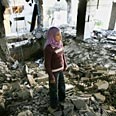
Cast Lead takes toll
צילום: רויטרס
Humanitarian aid officers begin training
Civilian casualties in Gaza spur IDF to begin placing officers trained in civilian needs on battlefields
The Israel Defense Forces has begun training for the first time officers from within the various brigades and battalions in order to serve during times of emergency as humanitarian aid officers in the battlefield.
The course, which aims to teach the officers how to deal with humanitarian crises during times of war, constitutes the implementation of one of the IDF's conclusions following Operation Cast Lead in Gaza.
After the operation, in which civilian casualties abounded, Coordinator of Government Activities in the Territories Major-General Eitan Dangot ordered the army to speed up research on the subject of humanitarian aid, which had already been in effect.
A special school was set up for the purpose of training cadets in the field, yielding the first humanitarian aid course in the IDF.
"We chose officers of ranks ranging from lieutenant to major, all of them already serving in the battalions and brigades," explained Lieutenant-Colonel Guy Stoltz, who runs the course.
Officers learn about civilian infrastructure, the areas in which they will be stationed and characteristics of the local population, humanitarian needs, international organizations, and the effects of the press.
Stoltz says the IDF is trying to combine knowledge of battle standing operative procedure with that of civilian needs by using real-life examples from the battlefield.
"The officers face certain scenarios that took place during the Second Lebanon War and Operation Cast Lead, such as the evacuation of disabled civilians from the battlefield, opening a route for rescue vehicles, removal of bodies, humanitarian lapses, etc," he said.
'Officers must be opinionated, stubborn'
"In our age this is extremely important. You can't win wars without being extremely aware of the issue of the population," Lieutenant-Colonel Khatib Mansour, who commands the coordination and liaison school, told Ynet.
"These officers are charged with standing before commanders, at times stubbornly, and directing their attention to these issues."
Mansour admits that there is no foolproof way of handling the various situations, but insists that knowledge is power. "We look for opinionated officers, with mental strength, who know how to recognize all sorts of problems that can arise during battle and supply the commanders with professional advice that takes their stance into consideration," he said.
"Commanders today know that if they do not consider these matters, their operational achievements will be ignored. In the conflicts awaiting the IDF it is not enough to reach lines of defense, they must be reached in the right way."
The first 24 cadets of the course will return to their posts in order to combine their training with regular drills. They will also take courses in the Arabic language.
In the meantime, the army plans to open additional courses and in 2011 begin supplying every unit with a "humanitarian aid officer". In the next stages, regular officers' course cadets will undergo the course as part of their training.
- Follow Ynetnews on Facebook










